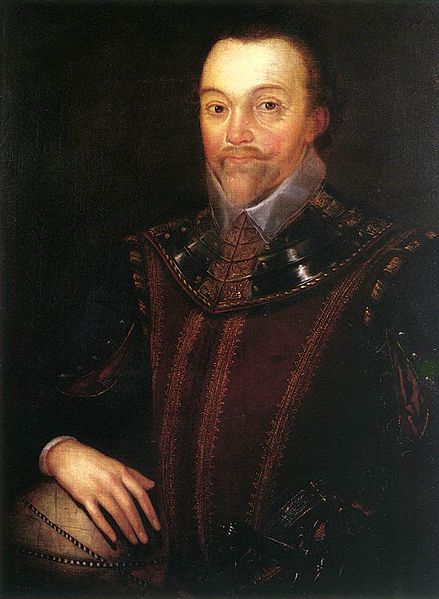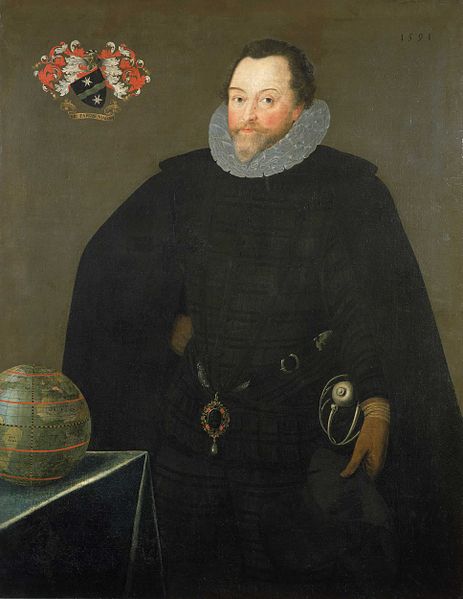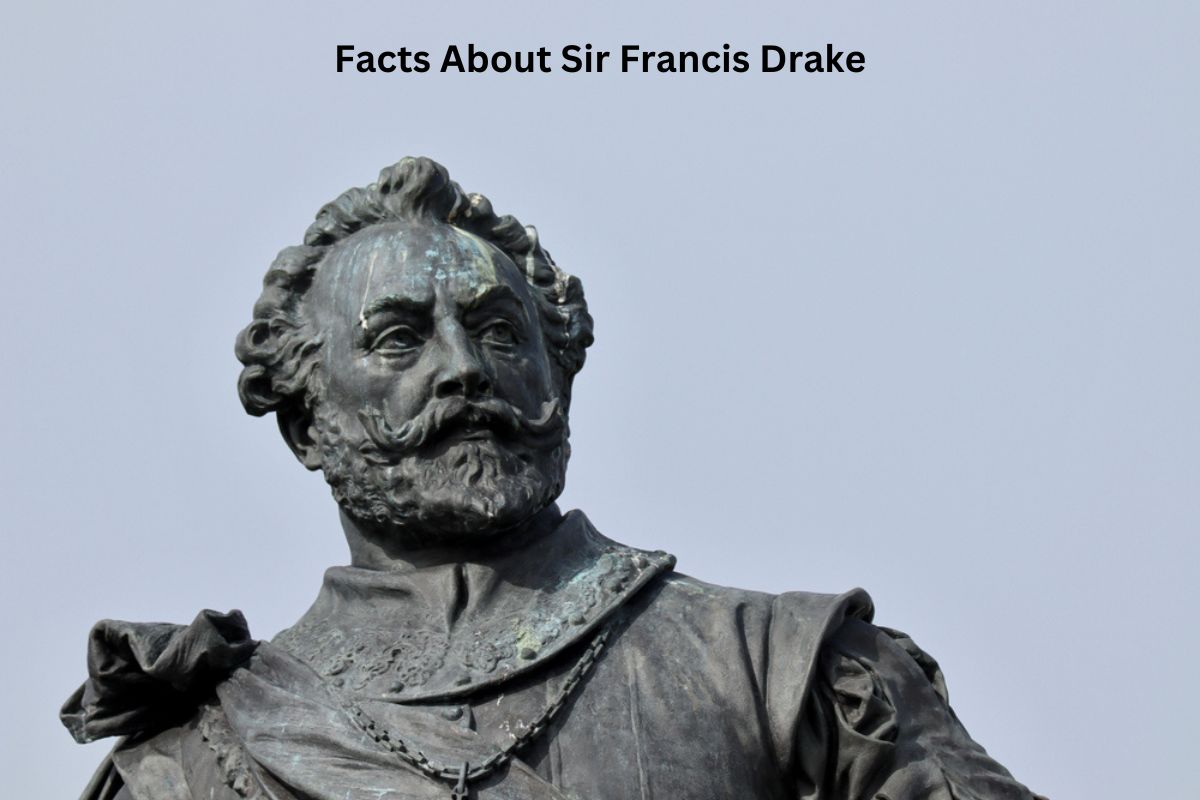Sir Francis Drake (c. 1540 – 1596) was an English sea captain, privateer, explorer, and naval hero of the Elizabethan era. He was born in Tavistock, Devon, England, and rose to prominence as a daring and skilled navigator.
Drake became famous for being the first Englishman to circumnavigate the globe (1577-1580) and for his successful privateering expeditions against the Spanish in the Caribbean and along the Spanish Main.
He played a pivotal role in the defeat of the Spanish Armada in 1588, earning him a knighthood from Queen Elizabeth I in 1581. Drake accumulated substantial wealth from his exploits and invested in land holdings, including Buckland Abbey in Devon.
He passed away in 1596 and was buried at sea off the coast of Panama. Sir Francis Drake’s legacy endures as a symbol of England’s maritime prowess and exploration during the Age of Discovery.
Sir Francis Drake Facts
1. Born around 1540 in Tavistock, Devon, England
Sir Francis Drake was born in the small town of Tavistock in Devon, England, during the early 1540s. His exact birth date is not known, but it is generally believed to be around this time.
Also Read: Sir Francis Drake Timeline
Devon was a region known for its maritime tradition, and this likely influenced Drake’s later career as a seafarer and explorer.

2. Renowned English sea captain and privateer
Drake is celebrated for his role as an English sea captain and privateer during the Elizabethan era. As a sea captain, he commanded various vessels and played a crucial role in English naval history. His skillful seamanship and navigation abilities made him a respected figure among sailors of his time.
3. First Englishman to circumnavigate the globe (1577-1580)
One of the most significant achievements of Drake’s career was his daring voyage around the world. In 1577, he set sail from England with a fleet of five ships, with the goal of exploring uncharted territories and raiding Spanish settlements.
After numerous adventures, including battles with the Spanish and encounters with indigenous peoples, Drake’s ship, the Golden Hind, returned to England in 1580.
Also Read: Accomplishments of Sir Francis Drake
This achievement made him the first Englishman to complete a circumnavigation of the Earth, a feat that brought him fame and recognition throughout Europe.
Drake’s circumnavigation not only expanded the world’s geographic knowledge but also demonstrated England’s growing maritime prowess and established him as one of the most renowned explorers of the Age of Exploration.
4. Conducted raids along the Spanish Main, gaining fame as “El Draque”
Drake gained significant notoriety for his daring raids along the Spanish Main, the northern coast of South America, and the Caribbean.
His actions included attacks on Spanish ports, ships, and settlements. One of his most famous exploits was the capture of Nombre de Dios, a Spanish town in present-day Panama, in 1572.
He seized vast amounts of silver and gold, earning him both immense wealth and a fearsome reputation among the Spanish. His success as a privateer led to the nickname “El Draque” (the dragon) among the Spanish.

5. Played a crucial role in the defeat of the Spanish Armada in 1588
Sir Francis Drake played a pivotal role in the defeat of the Spanish Armada, a powerful naval force sent by Spain to invade England in 1588.
Drake, serving as the vice admiral of the English fleet under Lord Howard, was responsible for initiating a series of devastating fire ship attacks on the anchored Spanish ships off the coast of Calais.
This tactic forced the Spanish fleet to break formation and scatter, severely weakening their offensive capabilities. Drake’s strategic brilliance and naval expertise contributed significantly to the English victory over the Armada, a momentous event in English history.
6. Knighted by Queen Elizabeth I in 1581
Queen Elizabeth I recognized Sir Francis Drake’s contributions and achievements by knighting him in 1581. The knighthood ceremony took place aboard Drake’s ship, the Golden Hind, which was anchored at Deptford.
Being knighted was a significant honor and a symbol of Drake’s high standing in the eyes of the Queen and the English court.
He was not only a renowned explorer and privateer but also a trusted adviser to Queen Elizabeth I on naval matters. This honor further solidified his status as one of the most esteemed figures of his time.
7. Accumulated wealth and land holdings, including Buckland Abbey
Sir Francis Drake amassed considerable wealth during his privateering expeditions, thanks to the treasures and spoils he acquired.
He invested his wealth in various ventures, including land acquisitions. One of the most notable properties he purchased was Buckland Abbey, located in Devon, England. Buckland Abbey became his family home and a place where he could enjoy the benefits of his newfound riches.
Today, Buckland Abbey stands as a historic property and museum, offering insights into Drake’s life and times.

8. Had a close and favorable relationship with Queen Elizabeth I
Drake enjoyed a close and favorable relationship with Queen Elizabeth I. The Queen saw him as a trusted and skilled naval commander.
His privateering activities against Spanish interests aligned with England’s geopolitical goals, and his successes brought both wealth and prestige to the crown.
Drake’s counsel was often sought on matters related to naval strategy and exploration. This close rapport with the monarch further elevated his status and influence in Elizabethan England.
9. Died of dysentery off the coast of Portobelo, Panama, in 1596
Sir Francis Drake passed away on January 28, 1596, while on an expedition in the West Indies. He succumbed to dysentery, a common ailment among sailors at the time.
Following his death, Drake’s body was placed in a lead coffin and buried at sea off the coast of Portobelo, Panama. It was his wish to be buried at sea, and this final journey marked a fitting end to the life of a renowned mariner and explorer.
10. Remembered for his contributions to English exploration and naval power
Sir Francis Drake’s legacy is enduring and multi-faceted. He is celebrated for his audacious circumnavigation of the globe, his victories against the Spanish Armada, and his role in expanding England’s naval power.
His privateering activities, while controversial, played a significant part in England’s emergence as a maritime superpower. Drake’s name is synonymous with exploration, adventure, and the maritime achievements of the Elizabethan era. He remains an iconic figure in English history, and his exploits continue to be studied and commemorated to this day.
